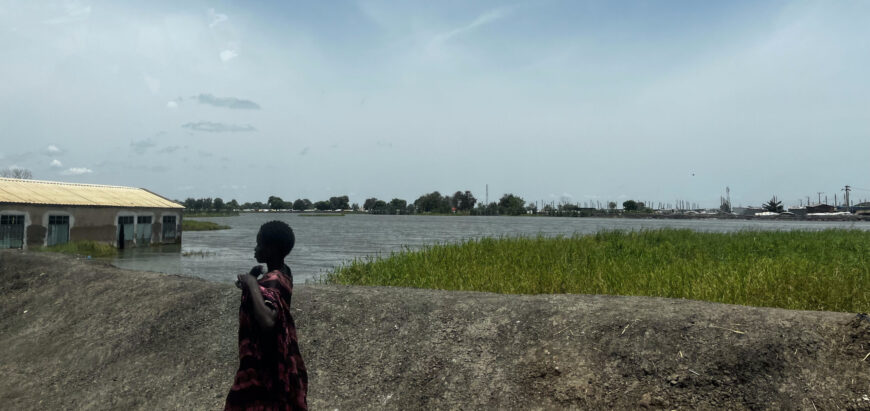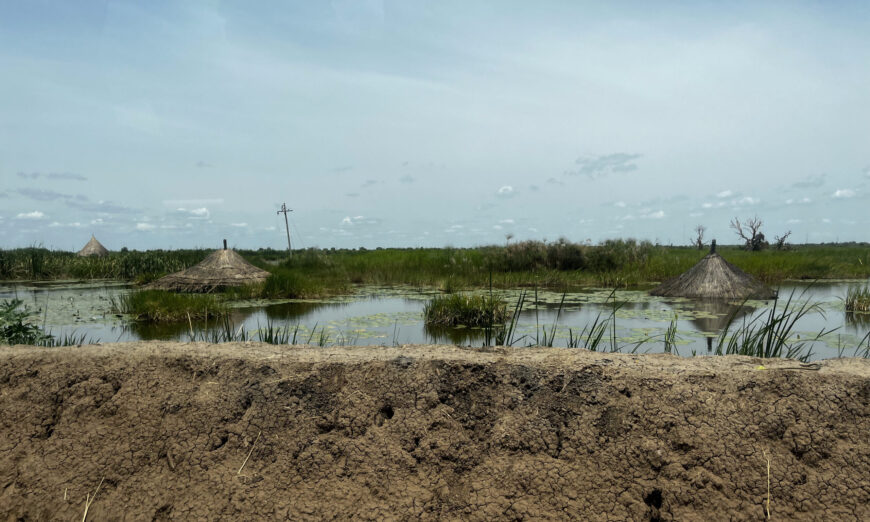Shamnaz Ahmed, CCCM Technical advisor for Acted, is also the co-coordinator of the Camp Management and Camp Coordination (CCCM) Cluster in South Sudan – a platform facilitating coordination among humanitarian actors to ensure effective service provision for displaced populations. Recently, she embarked on a field visit to Bentiu, Leer, Koch, Adok and Mayendit counties grappling with the devastating impacts of flooding, which can be directly attributed to climate change. Bentiu is home to a staggering population of over 104,000 displaced individuals, making it the largest internally displaced persons (IDP) site in South Sudan. Shamnaz takes us with her on this journey.
The cargo helicopter was landing on Leer’s vast airstrip. We waited for it under the shade of a tree, exhausted by the scorching sun. I thought back over the last week, the images flashing before my eyes.
Seven days ago, I landed in Rubkona, Bentiu. From the plane, you could see the flooded land. So much water! As we were about to land, I could see the dikes holding back the water from invading the remaining villages. Their weakness is visible; heavy rainfall will break them.
Upon my arrival at the humanitarian hub, I was warmly welcomed by my colleagues from UNHCR, IOM, and DRC. We embarked on a collective journey towards the Internally Displaced Persons (IDPs) sites. The road leading to the sites meandered through vast stretches of inundated land. It was a somber sight to witness tukuls, traditional huts, partially submerged in water, yet resiliently holding on, signifying the presence of a village.

These villages had fallen victim to the devastating consequences of the overflow of the River Nile in 2021, resulting in the displacement of thousands of people in Unity state including Bentiu. This catastrophe echoed throughout South Sudan, uprooting an estimated 9 million people from their homes. Even now, as time has passed, Bentiu remains submerged under the persistent floodwaters, serving as a haunting reminder of the ongoing challenges faced by the affected communities.
The collective efforts of IOM, DRC, and UNHCR are focused on ensuring the safety of the displaced individuals amidst the ongoing threat of flooding. To mitigate the impact of heavy rains, the sites near water sources are equipped with retention reservoirs. These reservoirs serve as temporary storage for excess water during downpours, which is then pumped out to the main river channel using generators that operate around the clock. However, in the event of generator failure, the sites are subject to rapid flooding. Therefore, the residents are provided with sandbags, shovels, and tools to maintain drainage systems ahead of the rainy season.
We went into the IDP site, witnessing a succession of huts that housed large families. Among them, I noticed a mother of four sitting at the entrance of her hut, attentively tending to seeds drying under the sun. Intrigued, I asked her about her activity. She explained that the lily seeds, collected two days ago, would take a few more days to completely dry. Once dried, they would be crushed into powder to make porridge, which would serve one single meal for her family in the following week.
When I asked her about her plans for the next day, her response was poignant.
We do not think about the future. I have food for today only. Tomorrow, I do not know how to manage food for my family. There is no work available. We do not have anything to hope for in the coming days. We are waiting for the day to pass.
Her words captured the profound challenges faced by these displaced families, where securing sustenance for the present day is a struggle, leaving little room for planning or hope for the future.
Thousands of families like this have been displaced by the floods, and their survival is determined by the whims of nature. The floods have severely affected crucial aspects of their livelihoods, making cattle rearing, vegetable cultivation, and agriculture increasingly challenging. Opportunities for sustaining a livelihood are limited, with fishing being one of the few viable options. However, the absence of a functioning fish market undermines the potential for selling their catch. As a result, much of the fish is poorly dried (losing its value), and the rest goes to waste.
On our way back, we discussed the visible impacts of climate change on people’s lives and well-being. Nature’s uncertainty, caused by torrential rains and overflowing rivers, is making livelihoods difficult. This explain the immediate humanitarian needs in Bentiu, and other waterlogged places in Unity State, emphasizing how crucial climate action is for the affected populations.

In the recent years, needs have severely increased across South Sudan, due to flooding, insecurity, population displacement, declined crop production, diseases and pests, the economic crisis, the effects of COVID-19, limited access to basic services, and the cumulative effects of prolonged years of asset depletion and loss of livelihoods [1]. In some parts of South Sudan such as Bentiu in Unity state in the North of the country, seasonal flooding is widespread, but its frequency and severity are increasing as a result of climate change, with the most severe observed in the past three years. Residents of those affected areas face dramatic challenges: loss of houses and livelihoods, shortages of food and basic services, health issues and education dropouts.
Thanks to OCHA’s support, Acted is also providing a one-year CCCM assistance in 5 displacement sites, in Fangak county, Jonglei state, neighbouring Bentiu, which is also affected by the effects of climate change.
Through this intervention, Acted support internally displaced populations and their host communities through the reinforcement and coordination of services provision, as well as reinforcing the displaced population’s capacity to manage the displacement sites, strengthening the representation of all groups (including women, youth, elderly). While accessing the sites requires Acted teams to spend hours on speedboats and canoes, this intervention provides essential support to populations to ensure proper upkeep and maintenance of sites, and to support community-led initiatives boosting livelihoods resilience, such as fishing and tailoring activities.
[1] IPC Acute Food Insecurity & Acute Malnutrition Analysis, October 2020 – July 2021
*The name of the beneficiary has been changed for protection purposes